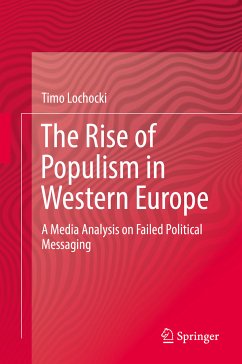This book explores the question of why and under which conditions right-wing populist parties receive electoral support. The author argues that neither economic variables, nor national culture or history are what account for their successes. Instead, he illustrates that the electoral success of populist parties in Western Europe, such as the French Front National or the Alternative for Germany, is best understood as the unintended consequence of misleading political messaging on the part of established political actors.
A two-level theory explains why moderate politicians have changed their approaches to political messaging, potentially benefiting the nationalist, anti-elitist and anti-immigration rhetoric of their populist contenders. Lastly, the book's theoretical assumptions are empirically validated by case studies on the immigration societies of Germany, the Netherlands and Sweden.
"Timo Lochocki's fascinating book systematically shows that the fortunes ofnationalist parties depend, at least in part, on the positions adopted by their more mainstream competitors."
Tim Bale, Queen Mary University of London, UK
"This book provides valuable insights into populist radical-right politics in Western Europe. Timo Lochocki argues that a "crisis of conservatism" created the perfect context for the rise of nationalist parties."
Cas Mudde, University of Georgia, GA, USA
"Timo Lochocki's book uses high-quality comparative research to tackle numerous misperceptions and mistaken assumptions about the rise and persistence of nationalist parties across Europe. It is a must-read for anybody following the debate on where Europe is today and where it might be tomorrow."
Matthew Goodwin, University of Kent, UK
Dieser Download kann aus rechtlichen Gründen nur mit Rechnungsadresse in A, B, BG, CY, CZ, D, DK, EW, E, FIN, F, GR, HR, H, IRL, I, LT, L, LR, M, NL, PL, P, R, S, SLO, SK ausgeliefert werden.









